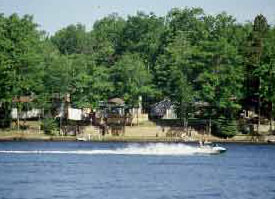|
Climate Change & Tourism The Great Lakes region’s natural beauty and cultural heritage combine to attract tourists from all over the Midwest. Tourism is important to the region’s economy; however, there are stresses already evident. Perhaps the greatest current stress to the tourism industry is its own inherent instability.Tourism is primarily a service industry that is seasonal and highly dependent on low wage and benefit-free positions to staff its busy times at both eating and lodging establishments. Economic prosperity or woe during any given season is frequently dependent on normal weather fluctuations and other variables like gas prices and general consumer confidence. For instance, skiing and ski resort operation in the Great Lakes is more economically threatened by small snowfall fluctuations than its competitors in the Far West. So, relatively minor changes in snowfall can significantly reduce skiing days and total industry revenue generation. Regional stresses on tourism include water quality concerns about the Great Lakes (primarily Lakes Michigan and Erie) and continuing difficulties with the influx of invasive species. Both of these factors negatively affect the attractiveness of the biggest resource in the region – the Great Lakes.
|
|
